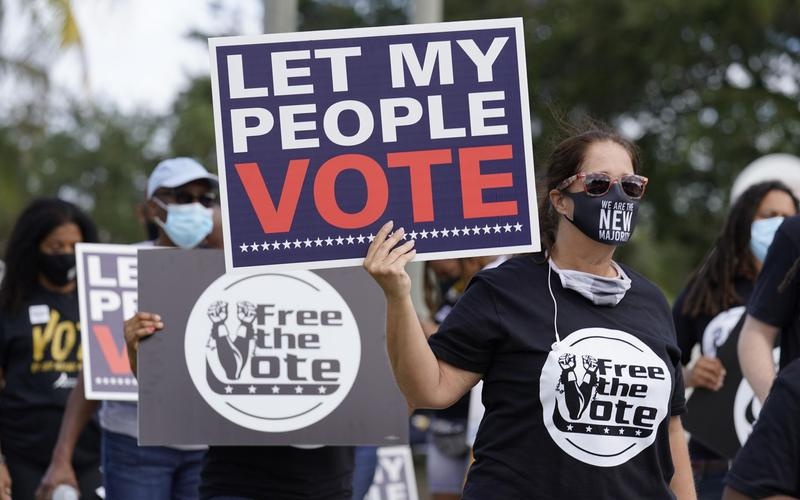A rally for voting rights in Fort Lauderdale, Florida, October 2020 (Marta Lavandier/AP)
Republican-led legislatures in two of the US’s four most populous states, Texas and Florida, are pushing through restrictions on voting rights.
Florida’s Governor Ron de Santis signed a measure on Friday. The Texas Legislature proceeded towards passage to ensure that it is one of the most difficult states in which to cast a ballot.
They follow Georgia, which adopted its restrictions in late March, amid Donald Trump’s lies that the 2020 Presidential election was stolen from him.
Florida and Texas backed Trump, but President Joe Biden narrowly won in Georgia, which had not voted for a Democrat since 1992. In January, Democrats Raphael Warnock and Jon Ossoff defeated GOP incumbents in Senate elections.
Texas, Florida, and Georgia have 81 of the US’s 538 electoral votes.
The Texas bill empowers partisan poll watchers, prohibit election officials from mailing out absentee ballot applications, and strictly punishes anyone who provides assistance beyond narrowly-permitted steps.
The Texas Senate did withdraw some of the most onerous provisions in the House version, including bans on drive-through and 24-hour voting and limits on voting machine allocations.
But the bill before the House included a host of new restrictions. It bans election officials from proactively mailing out absentee ballot applications or absentee ballots; sets strict new rules for assisting voters and greatly raises the punishment for running afoul of those rules; greatly empowers partisan poll watchers; and makes it much harder to remove a partisan poll watcher for bad behavior. The expansion of the authority and autonomy of partisan poll watchers has raised voter intimidation concerns among civil rights groups.
Florida’s de Santis, a possible 2024 Presidential candidate and loud Trumpist, signed the bill at a Palm Beach hotel with cheering supporters. Journalists were barred, with Fox TV given exclusive access.
The law restricts absentee ballot drop boxes, adds new identification requirements for ballot requests, and requires reapplications for absentee ballots in each election cycle.
The law also gives partisan election observers more power to raise objections and requires people offering voters assistance to stay at least 150ft (45 meters) away from polling places, an increase from the previous 100ft radius
The White House responded that Florida is “moving in the wrong direction“.
Deputy White House Press Secretary Karine Jean-Pierre said, “There is no legitimate reason to change the rules right now to make it harder to vote. The only reason to change the rules right now is if you don’t like who voted. And that should be out of bounds.”
Iowa has also imposed restrictions. Republicans in Ohio introduced a bill on Thursday. Drop boxes and ballot collection will be limited, and early in-person voting restricted by a further day.
Iowa and Georgia have already passed bills that not only impose new restrictions but grant those states’ legislatures greater control over the electoral process.
Democrats and activists reacted on Thursday with a call for urgency in passage of the For the People Act by the US Congress.
The House has adopted the Act, which seeks to enable voting by reshaping ballot processes, changing campaign finance laws, and mitigating state regulations.

